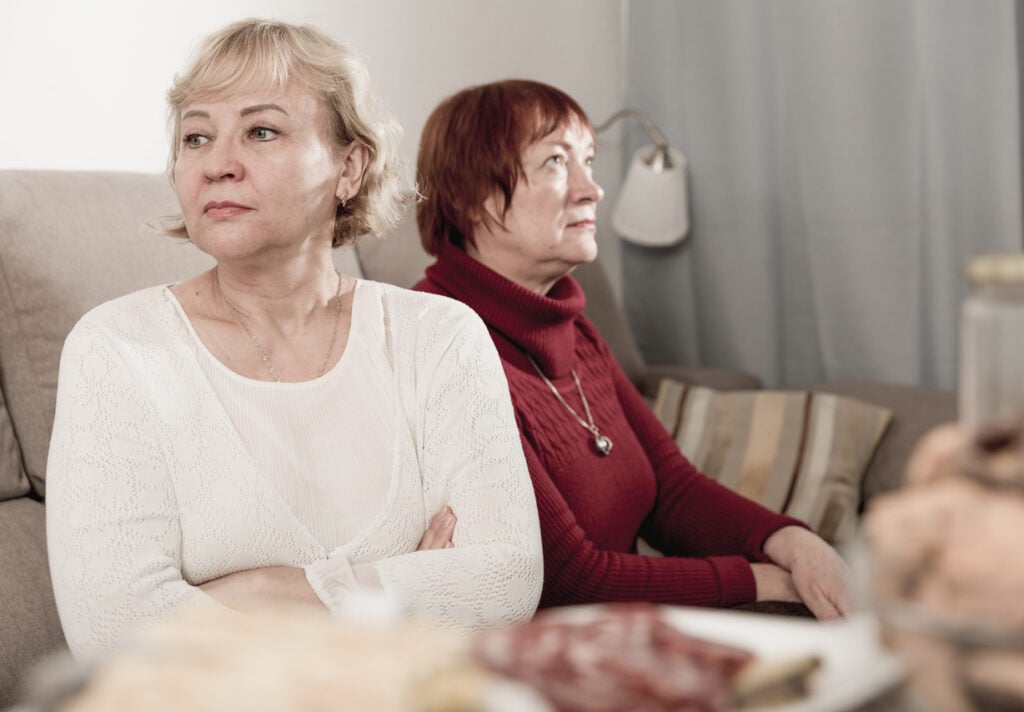Why lifelong friendships fade faster than you think—and what you can do about it.

You never thought you’d be losing friends at this stage of life, did you? But here you are, watching once-solid relationships slowly drift into silence. It’s disorienting. You may find yourself reflecting on how often you used to talk, how laughter came easily, and how simple it was to make plans. Now, those same friends seem distant—busy, unavailable, or simply uninterested. What used to be effortless has become strained, and the emotional impact of that slow fade can be heavier than you expected.
There’s no shame in feeling the sting of friendships changing or disappearing. In fact, it’s far more common than most people realize after 60. Life doesn’t slow down the way we imagined—it just shifts in unpredictable ways. Relationships that once defined you may no longer feel as grounding or secure. But there are still ways to understand these changes and take steps to preserve meaningful connections—or even build new ones. If you’re noticing your social world thinning out, here are 14 alarming truths behind the fade of lifelong friendships—and what you can actually do about them.
1. Your Social Circles Are Shrinking Faster Than You Realize

As we get older, the people around us naturally begin to scatter, as stated by Kelly Borresen at Huffpost. Friends move for retirement, become caregivers, face their own health crises, or even pass away. Regular get-togethers become less frequent. The shared environments that once nurtured friendships—workplaces, kids’ schools, neighborhood routines—dissolve, and the structure that supported your social life quietly disappears.
You might not even notice it until you realize you haven’t had a real conversation with someone outside your immediate circle in weeks. To counter this, be intentional. Join local clubs, attend neighborhood events, or volunteer somewhere meaningful. Reach out to old friends even if it’s been years. Those connections won’t rekindle on their own—but with a little effort, they can absolutely be revived.
2. Health Issues Are Limiting Your Social Life

Chronic health problems have a way of sneaking into every area of life—including friendships. Fatigue, pain, mobility challenges, and even hearing loss can make going out or keeping up with conversations overwhelming. Slowly, you may begin to decline invitations, or your friends may stop including you, assuming you’re not up for it anymore, as mentioned by Sheryl Kraft at Friendship Rules.
But staying social is often just as crucial to your health as managing medications. Look for low-impact activities like book clubs, gentle yoga, or simple tea visits at home. Explore virtual meetups if mobility is limited. Even one or two consistent social connections can dramatically improve your mood and resilience.
3. You’re Retired, and So Are Your Friends—But on Different Schedules

Retirement feels like it should come with endless free time for socializing, but that’s rarely the case. Some friends travel constantly, while others care for grandchildren full-time. Others dive into new hobbies or second careers. Your calendars no longer align like they once did, and spontaneous hangouts become a logistical challenge.
Instead of waiting for perfect timing, create consistency. Propose a standing coffee date or a monthly catch-up call. When it’s built into your routine, it becomes easier to maintain, even with busy or unpredictable schedules. Connection doesn’t have to be complicated—it just has to be deliberate, according to Margaret Manning at Sixty & Me.
4. Your Interests Have Drastically Changed

You’re not the same person you were ten, twenty, or forty years ago. Neither are your friends. It’s natural for passions, values, and worldviews to evolve. But when your current life feels out of sync with the people who knew you best, conversations can feel shallow—or worse, strained.
Instead of mourning what’s changed, honor it by pursuing what truly excites you now. Attend art classes, hiking groups, writing workshops—whatever lights you up. You’ll meet new people who reflect your current values. And surprisingly, rediscovering your own enthusiasm might even rekindle a connection with old friends who admire your growth.
5. Life Transitions Are Making You Drift Apart

Downsizing, relocating, becoming widowed, or caring for a loved one—all of these transitions can isolate you in ways you didn’t expect. The emotional toll of these life changes can create a sense of separation from those who aren’t going through the same thing. Routines fall away, and the silence grows.
You may not be able to maintain the same frequency of contact, but even small gestures matter. Send a “thinking of you” card, share a photo, or call during a drive. You don’t have to carry the weight of a deep conversation every time—sometimes just being present is enough to keep the bond alive.
6. Emotional Distance Is Creeping In

Friendships often rely on mutual vulnerability. But with time and life challenges, it’s easy to become guarded. Maybe you’ve both endured loss, hardship, or disappointment. Without realizing it, the emotional closeness starts to slip. Conversations become superficial, and the heart-to-heart moments disappear.
If you sense that emotional distance widening, don’t ignore it. Choose to share something personal—a fear, a win, even a regret—and see if your friend responds in kind. Vulnerability invites connection, and just one honest moment can reignite a friendship that felt lost.
7. You’re Spending Too Much Time Online

Scrolling through updates and sharing memes might seem like a form of connection, but it rarely replaces real friendship. Social media tends to flatten relationships, creating the illusion of closeness while actually making us feel lonelier. You start thinking you’ve “caught up” because you liked their post, but months pass without a real conversation.
Instead, treat social media as a tool, not a substitute. Use it to set up coffee dates, phone calls, or video chats. Pick one or two friends and message them to catch up the old-fashioned way—with time and attention. Real friendships require more than emojis and likes.
8. Your Friends Are Prioritizing Family Over Friendships

At this stage of life, family demands can be all-consuming. Adult children may need support, grandkids need watching, and elderly parents need care. Many people prioritize their family roles over friendships, leaving little time or energy for socializing.
It’s easy to feel forgotten or pushed aside, but try not to take it personally. Instead, offer to meet them where they are. Invite them to family-inclusive outings or ask how you can stay involved. Even a short walk during their errands might be enough to keep your friendship alive.
9. Distance Is Widening the Gap

Even if the friendship hasn’t changed, geography often does. Friends move across the country to be near family, seek better weather, or pursue a new chapter. Suddenly, your everyday connection is reduced to texts and sporadic calls. Without shared space, it becomes harder to stay relevant in each other’s lives.
If in-person visits aren’t realistic, schedule monthly video calls, write letters, or send small care packages. Don’t wait for them to initiate. Long-distance friendships need intentional nurturing, but when they’re genuine, they can thrive even through miles.
10. You’re Holding on to Grudges

Old wounds can quietly undermine a friendship. Maybe they said something years ago that hurt you, or you’ve grown tired of always being the one to initiate. Over time, these grievances fester and become barriers to reconnection, even if the love is still there.
Forgiveness is a muscle you have to flex—especially later in life. Reach out, speak honestly, and express what matters without blame. Often, both of you are holding onto something that needs to be released. Healing old rifts might be the most meaningful act of friendship you’ll ever make.
11. You’re Not Making New Friends Anymore

It’s easy to assume your circle is set after a certain age, but that mindset can trap you in loneliness. When old friendships fade and no new ones emerge, isolation becomes your default. You stop reaching out, stop introducing yourself, and convince yourself that it’s too late.
But it’s not. Some of the best friendships of your life might still be ahead. Sign up for something new—a walking group, creative class, or volunteer shift. Say yes more often. Every friendly hello has the potential to grow into something that surprises and fulfills you.
12. Negative Attitudes Are Pushing People Away

Grief, disappointment, and stress can all weigh heavily in later life—but constant negativity wears on relationships. If your conversations consistently veer toward complaints or pessimism, friends may begin to pull back, unsure of how to help or unwilling to absorb the emotional weight.
Start small. Practice gratitude by naming one good thing each day. When with friends, make a conscious effort to share light, humor, and curiosity. You don’t have to fake joy, but balancing your struggles with warmth and openness keeps friendships from turning into emotional burdens.
13. You’re Stuck in Old Communication Habits

Many friendships were built during a time when dropping by unannounced or having long phone chats was normal. But today, communication has changed. People expect texts, plan ahead, and juggle more commitments. If you haven’t adapted, it might seem like your friends are ignoring you.
Adjust your approach. Send a casual text asking when they’re free or leave a thoughtful voice message. Embrace tools like FaceTime, group chats, or even private social media groups. Meeting people where they are—technologically—can breathe new life into a once-dormant friendship.
14. Your Own Isolation is Becoming a Habit

The longer you go without social interaction, the more comfortable isolation feels. What starts as a break from busy schedules turns into entire weeks spent alone. You begin telling yourself it’s easier this way—even as your heart quietly aches for connection.
Breaking that cycle takes courage, but it starts with one step. Invite someone for a walk, attend a free event, or simply sit in a café and say hello to a stranger. The momentum of social connection is real. Once it begins, you’ll remember how good it feels to be seen and heard—and that’s often enough to keep going.
